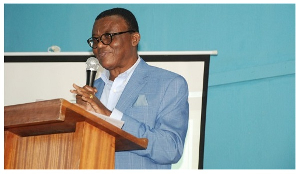 Former UN Senior Governance Advisor, Prof. Baffuor Agyeman-Duah
Former UN Senior Governance Advisor, Prof. Baffuor Agyeman-Duah
Former UN Senior Governance Advisor, Prof. Baffuor Agyeman-Duah, has expressed concern over the growing trend of replacing Electoral Commission (EC) heads whenever there is a change of government in Ghana.
He described this practice as a significant threat to the country’s democratic stability.
Speaking at the 2024 Ghana Speaks High-Level Forum, organised by the Institute for Democratic Governance (IDEG), Prof. Agyeman-Duah highlighted the removal of Charlotte Osei, the former EC Chair, as an example of this recurring issue.
Ms Osei was ousted following the New Patriotic Party (NPP)’s victory in the 2016 elections, and now the opposition National Democratic Congress (NDC), which opposed her removal at the time, has threatened to replace the current EC Chair, Jean Mensa, if they win the 2024 elections.
Prof. Agyeman-Duah warned that this cycle of dismissing EC heads with each new administration is dangerous and undermines the integrity of the electoral process.
“The suspicion is always there,” he remarked, referring to the perception that EC heads are politically biased due to their appointment by the president.
He added that frequent leadership changes at the EC threaten public confidence in the body’s impartiality and compromise the stability of Ghana’s governance.
He urged political parties to break away from this pattern, stressing the importance of maintaining continuity and impartiality within the Electoral Commission.
Drawing on examples from Western democracies, Prof. Agyeman-Duah argued that EC leadership transitions in such countries are less politicised, ensuring the stability and credibility of their electoral systems.
He also called for a review of the current appointment process for EC leaders in Ghana.
“The president doesn’t have to appoint,” he stated, advocating for alternative methods that would prevent the perception of bias and ensure the independence of the EC. Prof. Agyeman-Duah emphasised that learning from other democracies could help preserve the integrity of Ghana’s elections.
The academic noted the ease with which EC heads can currently be removed, explaining that a single petition to the president can lead to a process initiated by the chief justice, potentially resulting in the dismissal of the EC chairperson.
He warned that this process undermines the democratic system and called for reforms to ensure that future changes in EC leadership are not driven by political interests.
Prof. Agyeman-Duah’s remarks highlight the pressing need for Ghana to address the politicisation of its Electoral Commission, as the country prepares for the 2024 general elections.